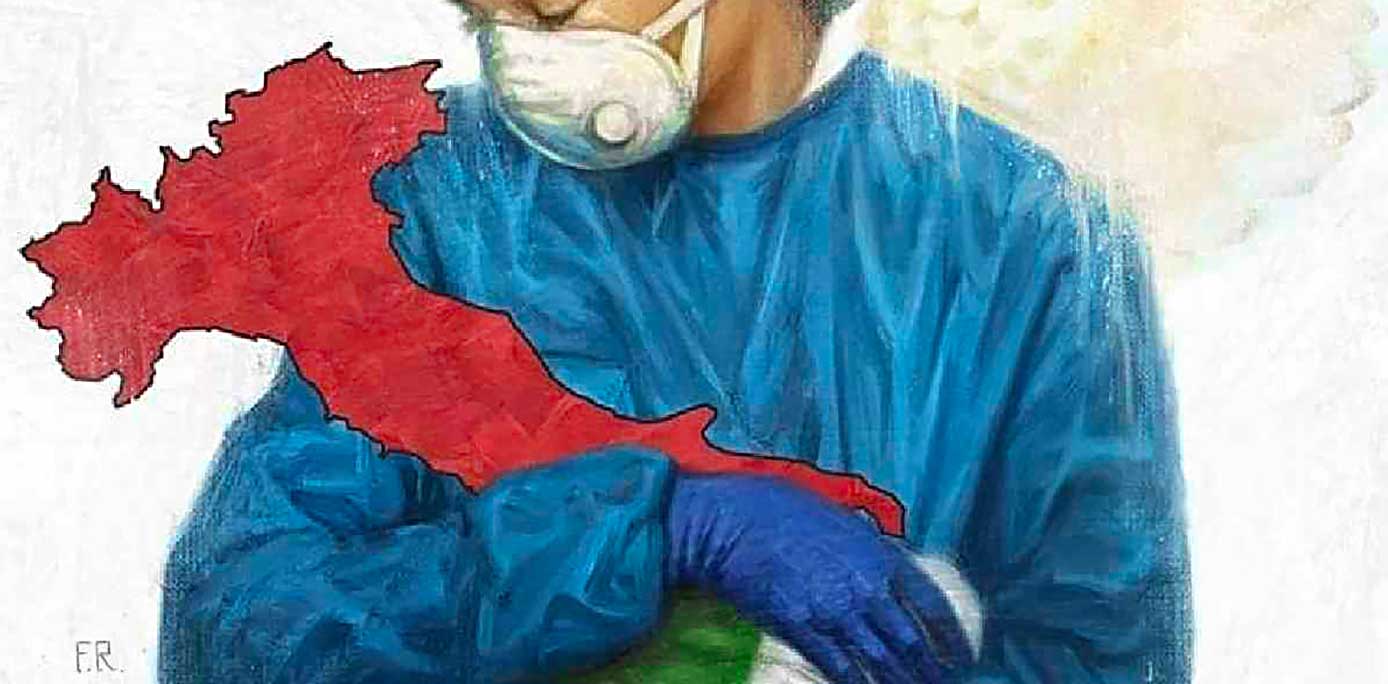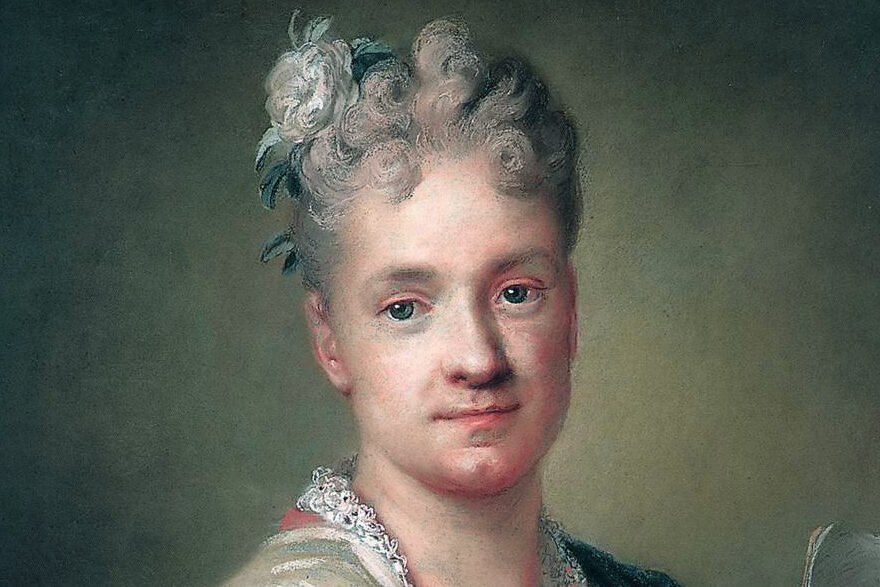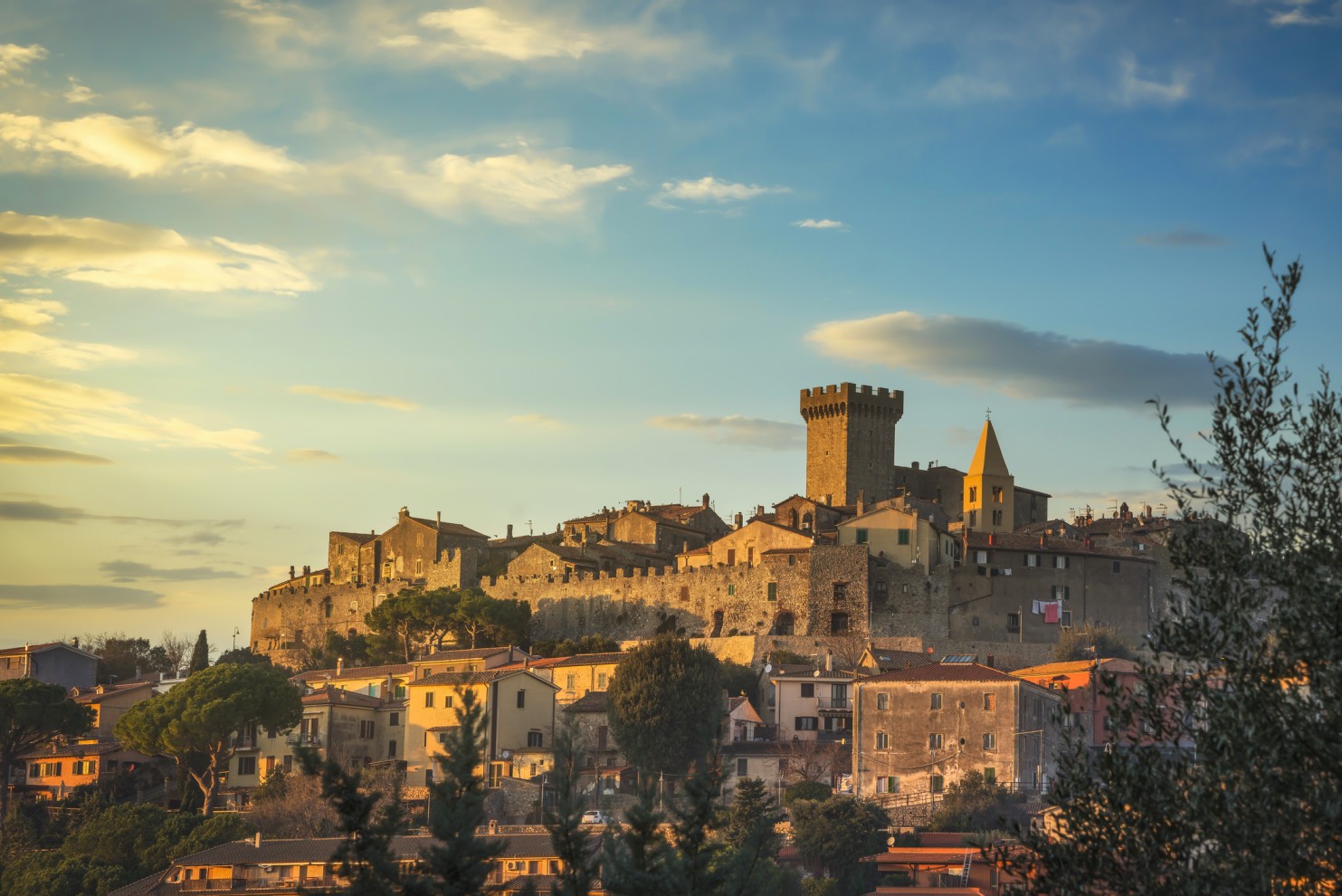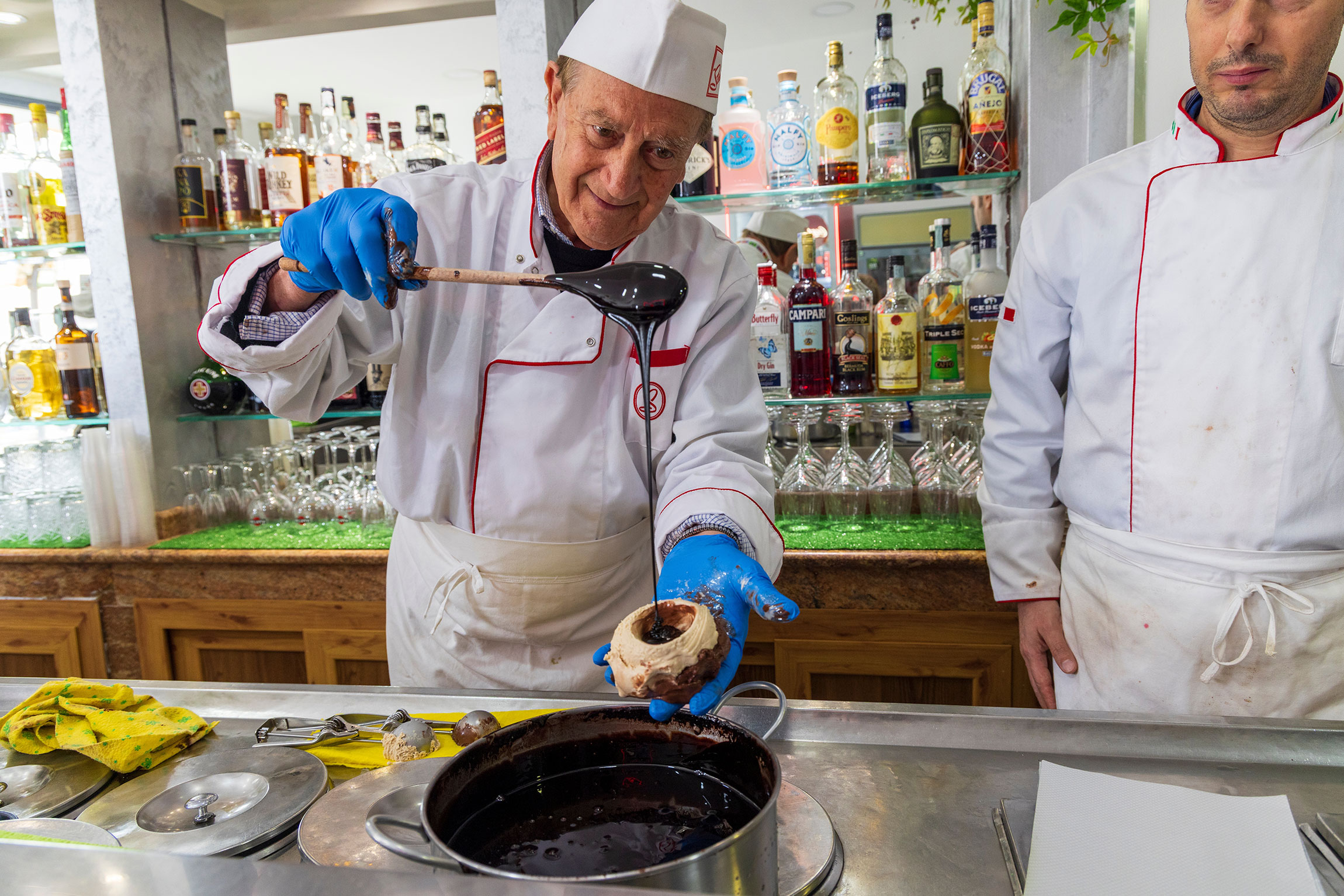I woke up to a dystopian reality on February 22 when at dawn I heard that the novel coronavirus exploded in our efficient, modern, German-like Lombardy region.
I was unprepared and skeptical like the majority of us. We all ignored the warning of virologists at our peril. In the beginning, we thought it was a rising hysteria. No, it wasn’t.
We thought Wuhan, where the zoonotic virus originated, was almost on another planet. We don’t have anything to do with that reality in China, I thought. That virus will never arrive in our beautiful Italy. I was wrong.
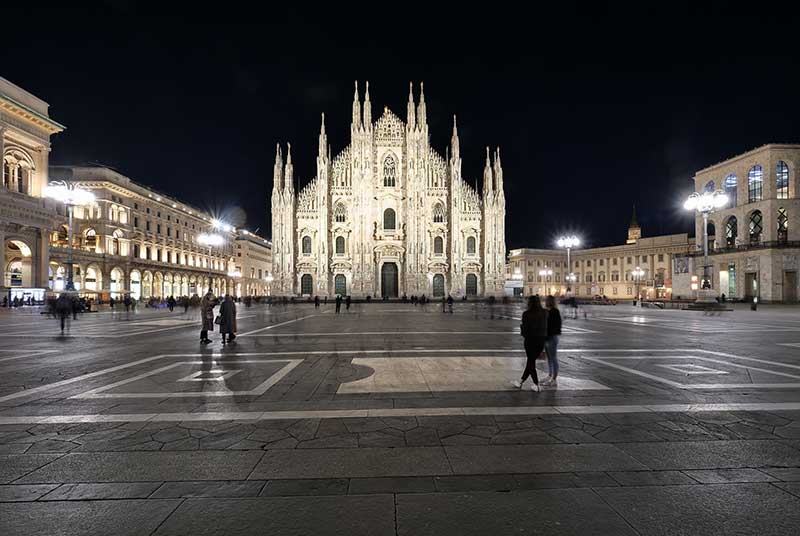
Today, the entire country is a stunning prison. Our architectural wonders with almost no sign of human activities tell us how we were lucky to live here, in this paradise on earth, before the beast sneaked in.
Now words will help exorcise this demon of discomfort, bitterness, and incredulous anger.
I didn’t believe my eyes when the numbers of contagions soared just in a few days. The biggest outbreak in Europe is still Lombardy, the engine of Italy’s economy, together with Emilia-Romagna and Veneto, the second and the third worst-affected regions.
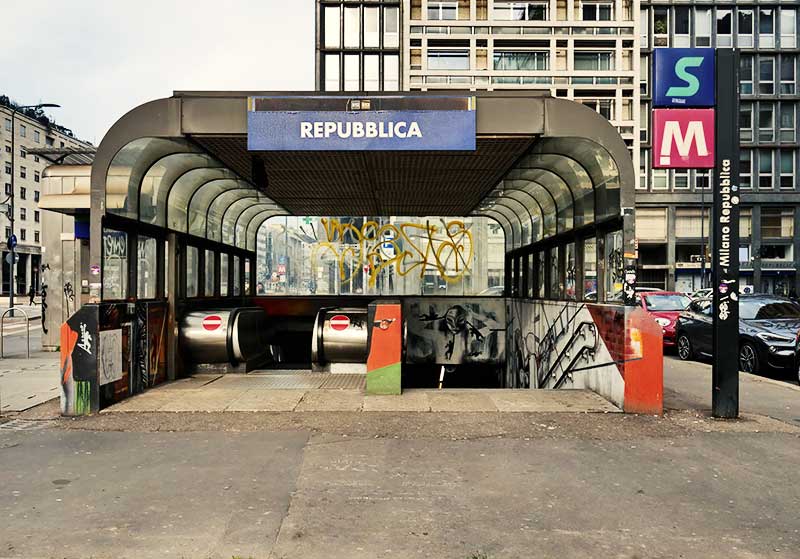
Unfortunately today, the unforgiving Covid 19 has been detected across the entire peninsula, the reason why on March 8, as the number of infections surpassed 9,100, Italian Prime Minister Giuseppe Conte announced to place Italy on lockdown as a massive expansion of the previous lockdown order for Lombardy and other 14 Northern provinces. “There won’t be just a red zone, but there will be Italy, a whole protected zone,” he said during a historic press conference held at 2.30 A.M.
People can leave their towns and their regions only out of serious necessity– for compelling business reasons, health reasons or because they have to return to their homes. Each person needs to carry a self-certification form to justify valid travel within the regions, even entering and exiting one city or another. You can face up to three months of jail for making a false declaration.
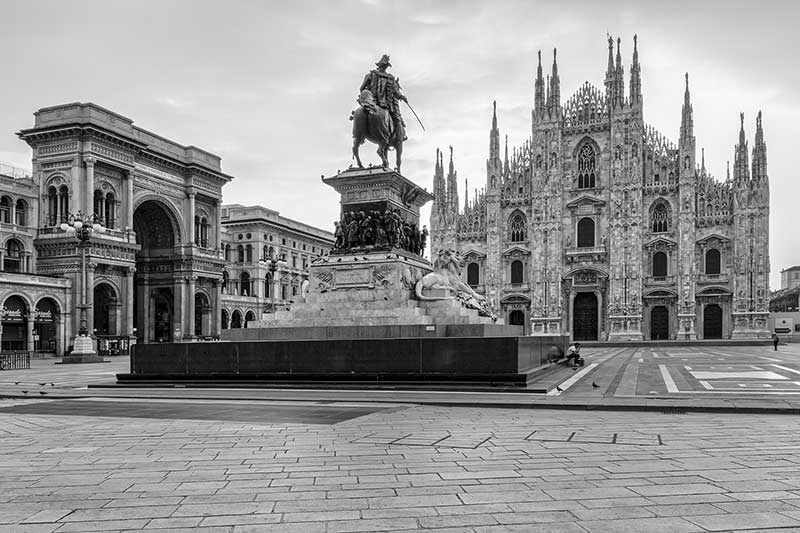
Today our cities are not paralyzed by a psychosis, but instead by the facts.
We now see that Covid-19 is nasty. All we got to do is stay calm, resilient and united to stop the spread. We must practice preventive measures daily, and strictly follow the rules imposed by our national and local institutions.
We must confront the coronavirus with solidarity and we need mindful attention to our bodies. Solidarity is humanity. I feel a sense of connectedness to the misfortunate, but I am not capable of mercy towards the powerful who in China did not protect the most vulnerable. By shutting the mouth of the righteous in the beginning, they created chains of suffering.
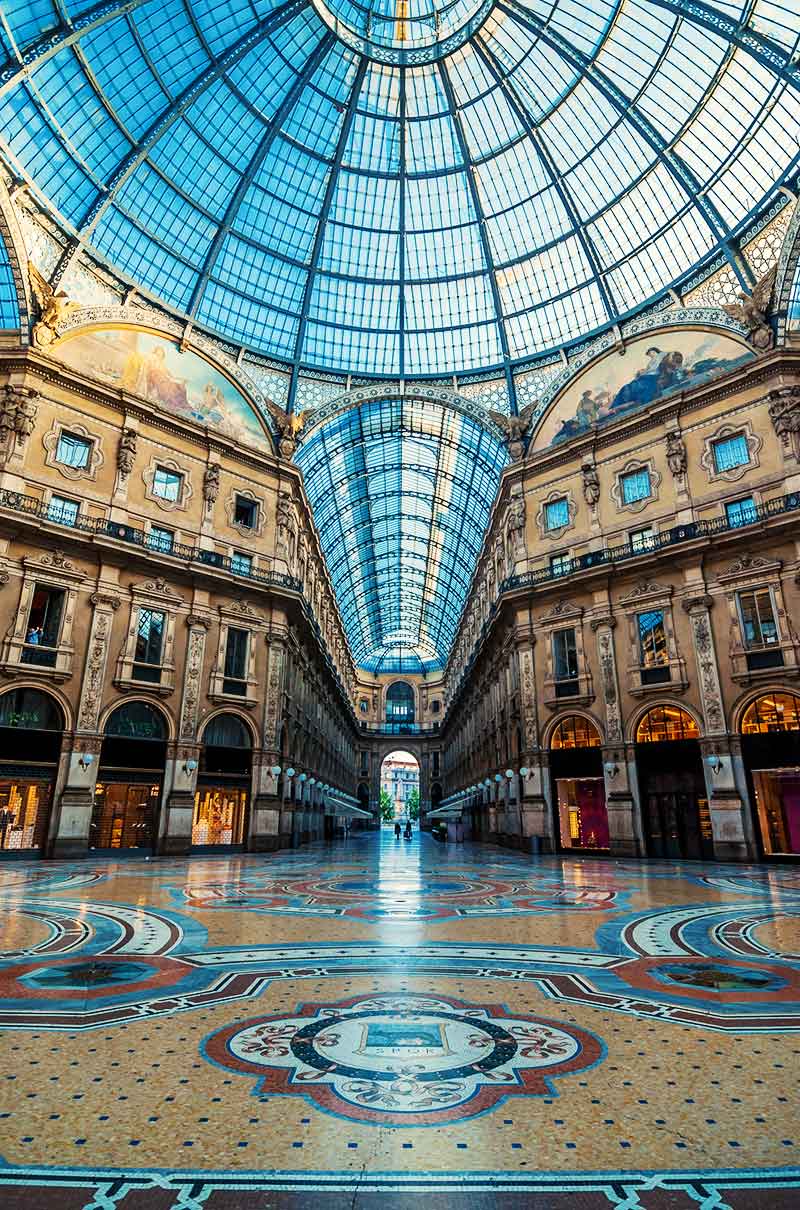
But where did Italy go wrong?
I believe the coronavirus flew to Italy weeks earlier. Travel spread the virus like wildfire.
Lombardy, and in general Northern Italy, have a very large number of Italians who travel back and forth to China on business and a big Chinese community that keeps solid contact with their ancestral land. If you are slow to announce the virus outbreak as was the case with the Chinese government, which suppressed the voices of those who tried to warn the country, it means that people have a bigger chance to spread the virus without even knowing it. Not to mention the 5 million people who left Wuhan before the quarantine went into effect as Chinese traveled around the world for their Lunar New Year. Two of them, an older couple, became our first coronavirus cases in Italy. They traveled across Italian cities, before being hospitalized in Rome. Italy has welcomed the highest number of Chinese tourists in Europe for the last two years.
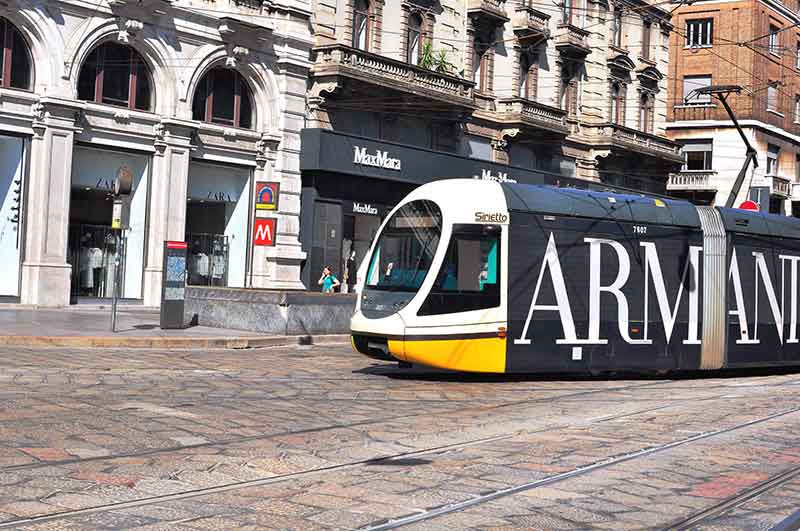
The streets of Milan are eerily empty. Even the Galleria Vittorio Emanuele II, the most sophisticated shopping mall and a major landmark of the city, is overlaid with the melancholy of a Giorgio De Chirico painting.
Our cities are unreal, semi-deserted, including Venice and also Bergamo, where I had not thought death had undone so many.
To curb the spread of the novel coronavirus pandemic, school classes are suspended in the entire country and businesses asked employees to work from home. On March 11, Italy shut all stores except for pharmacies and food shops.
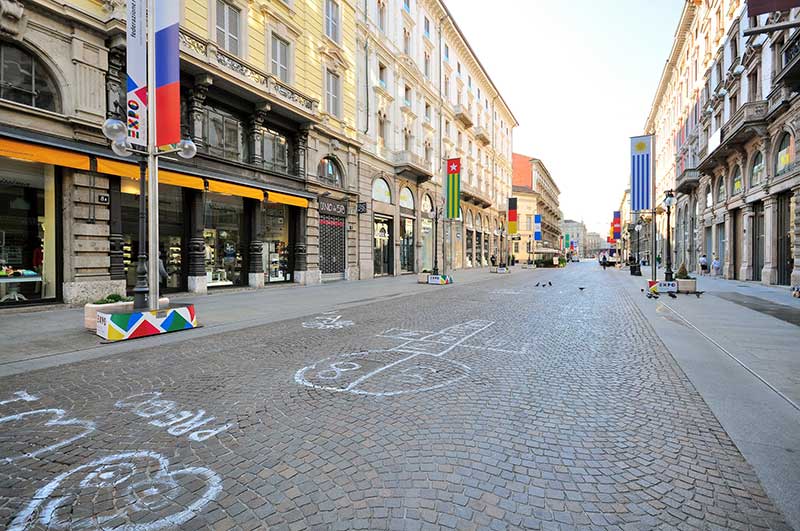
This desolate atmosphere evokes the memory of a historical novel Italians read in high school as part of our compulsory education: Alessandro Manzoni’s The Betrothed. The masterpiece is set in 17th century Lombardy under the Spanish rule, when the plague spread during Milan’s epidemic of 1630, killing two-thirds of the population. Those figures are incomparable with the circumstances of today. At the time, locals believed the devil had rented an apartment in Milan to carry out his nefarious deeds without knowing the pestilence was brought by German mercenary soldiers who sacked the Duchy of Mantua.
In 17th century Milan, dead silence reigned through the streets, unbroken except for the dull sound of the bell carried by the Monatti, the pestilence cleaners. Then, the poor were the ones to go first. Today, the majority of fatal victims are the elders who already went through all kinds of troubles in their lives. They battled fascism in this country, they survived WWII, and with sweat, hard work and determination managed to rebuild the nation. And if they die of a zoonotic disease originating from Wuhan it does not matter much, some hint, because they had other pathologies anyway. Elders are not a waste of society, but they have become the forlorn people.
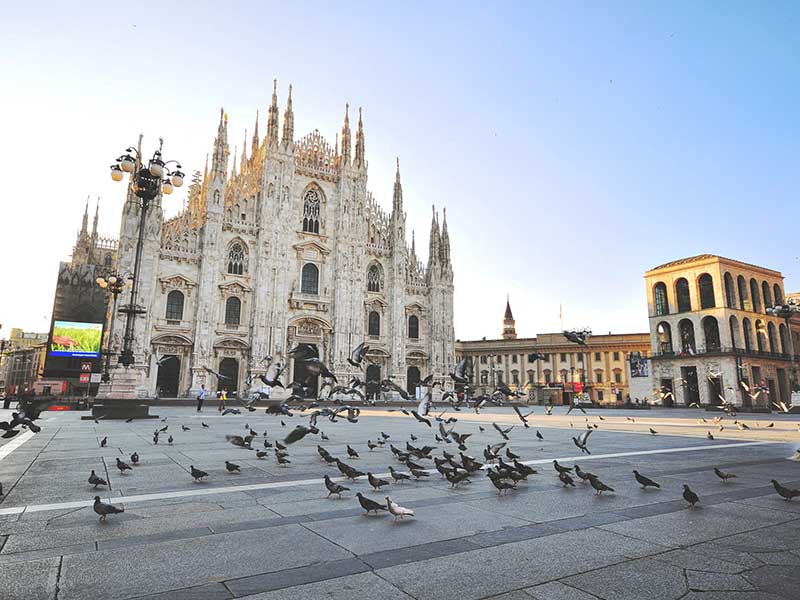
The majority of deaths (42.2 percent) occurred in the age group between 80 and 89, and 32.4 percent were between 70 and 79, but the elders are not the only hit ones. The 60 to 69 age group had a fatality rate of 8.4 percent, and 2.8 of the fatal victims were between the ages of 50 and 59. The coronavirus mortality rate in Italy appears to be about 5 percent. When this story was written, on March 14, Italy had a total of 1266 deaths and almost 15,000 infections.
According to data provided by Istituto Superiore di Sanità or Higher Institute of Health on March 9, 22 percent of people aged between 19 and 50 years old tested positive. Some 1.4 percent were patients under 19, 37.4 percent between 51 and 70 and 39.2 percent were over 70.
Also, some TV presenters, judges, journalists, city prefects, doctors, generals, and even politicians have tested positive.
“If we reduce contacts between people by 70 percent, within 3 months we see the light again,” says Prof Massimo Galli, the director of infectious diseases at Sacco hospital in Milan. Three months, not three weeks.
Italy has been the hardest hit in Europe, but alarm is now high in other European countries as well.
The first step in the fight is for the public to adapt to the new change and help stop the spread. That isn’t the obligation of the government or the result of heroic efforts by doctors, rather the personal responsibility of all citizens to follow sanitary protocols.
Finally, last week Italians seemed to find courage, determination, and morality to face up an almost unbearable reality. But the first three weeks many citizens didn’t show to possess a high degree of civic sense. They could not renounce their aperitifs, their happy hours and their nightlife. They kept gathering in bars and restaurants, in discos and at the ski resorts, without taking a living interest in the public health while newspapers announced the daily death toll in our regions. They didn’t recognize that we are interwoven, all part of the web of interdependence.
The acme of irresponsible behavior occurred on March 8 when thousands crowded Milan train stations to fled South, storming the night trains after a draft decree banning people from leaving or entering the region was revealed by the press.
“What happened with the news leak has caused many people to try to escape, causing the opposite effect of what the decree is trying to achieve,” warned Roberto Burioni, a professor of microbiology and virology at Vita-Salute San Raffaele University in Milan. “Unfortunately some of those who fled will be infected with the disease.” And some of them will possibly infect their relatives down in the South.
A few hours after Prime Minister Giuseppe Conte announced the sweeping movement restrictions, influential musicians, artists, and film directors began promoting the #iorestoacasa (I Stay Home) hashtag.
People finally got the message. By staying home, trends can reverse. We need to stay strong, stay united and fight the disease together.
But again, where did Italy go wrong?
In the beginning, lack of cohesion, inconsistency and constant bickering were the elements of politics that failed to foresee the predictable disaster due to its original gaps and holes.
Suddenly on January 31, Italy suspended all air traffic from China. Did that decrease the risk? People arrived in Italy by catching connecting flights in other countries as some Italians recounted their experience in Bangkok airport where nobody screened their temperature.
As well, before January 31 in Italy, there was no formal invitation to quarantine for any person coming from China, whether Italian or Chinese. Quarantine protocols were activated on February 3. Was the political class trying to preserve a wonderful relation with a giant with feet of clay?
Yet, a few weeks later I felt proud of the way my country followed a transparency policy of sharing accurate data on this health crisis. Maybe Italy has also contributed to the general drive towards more transparency in Europe. No data were hidden in my country that also allowed its most recent medical class of nurses to graduate now so they can enter service.
As Italy adjusts to life under drastic quarantine measures, doctors at hospitals in Lombardy have described how intensive care units are overwhelmed with patients who require ECMO, extracorporeal membrane oxygenation. The situation is heartbreaking.
We were not afraid of showing our confrontation with death. This herculean moment is experienced with authenticity and openness. It will be illuminated so indelibly with the dignity of the hard-working Italians. From this horrendous adversity, we will flourish stronger than ever.
We honor our doctors who do take the Hippocratic Oath trying to save lives with no distinctions of wealth, income, education or culture. We need to be grateful to our universal health care that proves to be a compassionate force against the ravages of Coronavirus.
Like Job, we struggle with wanting to know why this happened. We want to find meaning when life doesn’t make sense. But answers are no easy. There are just haunting questions.
There is a painting by Canaletto commemorating the end of the terrible plague of 1576, on August 16, the feast day of St. Rocco, the protector against all contagious diseases. After Mass, the Doge and senators in red togas would leave the church as the survivors would carry nosegays as a memorial of the plague.
This will be soon a painful memory. After housebound residents under lockdown in Naples spontaneously broke into song from their balconies on last Friday, starting a flash mob across the country that sang and played instruments from home at the same time, it became clear that Italy would endure the virus but not succumb to it. Our lives, discolored with our present woe, will shine with happier hours.
Mi sono svegliata in una realtà distopica il 22 febbraio quando all’alba ho saputo che il dramma del Coronavirus era esploso nella nostra efficiente, moderna regione di stampo tedesco, la Lombardia.
Ero impreparata e scettica come la maggior parte di noi. Abbiamo tutti ignorato l’avvertimento dei virologi, a nostro rischio e pericolo. All’inizio pensavamo che fosse un’isteria crescente. No, non lo era.
Pensavamo che Wuhan, dove il virus zoonotico ha avuto origine, fosse quasi su un altro pianeta. Pensavo che non avessimo nulla a che fare con quella realtà della Cina. Quel virus non arriverà mai nella nostra bella Italia. Mi sbagliavo.
Oggi, l’intero Paese è una sbalorditiva prigione. Le nostre meraviglie architettoniche, senza quasi alcun segno di attività umane, ci dicono come siamo stati fortunati a vivere qui, in questo paradiso terrestre, prima che il mostro vi si intrufolasse.
Ora le parole aiuteranno ad esorcizzare questo demone del disagio, dell’amarezza e della rabbia incredula.
Non ho creduto ai miei occhi quando il numero dei contagi è salito in pochi giorni. Il più grande focolare epidemico in Europa è ancora la Lombardia, il motore dell’economia italiana, insieme all’Emilia-Romagna e al Veneto, la seconda e la terza regione più colpita.
Purtroppo oggi, l’implacabile Covid 19 è stato individuato in tutta la penisola, motivo per cui l’8 marzo, quando il numero di infezioni ha superato quota 9.100, il Presidente del Consiglio Giuseppe Conte ha annunciato che l’Italia era in isolamento, una massiccia espansione del precedente ordine di blocco per la Lombardia e altre 14 province del Nord. “Non ci sarà solo una zona rossa, ma ci sarà l’Italia, un’intera zona protetta”, ha detto durante una storica conferenza stampa tenutasi alle 2.30 del mattino.
Le persone possono lasciare le loro città e le loro regioni solo per gravi necessità: per motivi di lavoro, di salute o perché devono tornare a casa. Ogni persona deve portare con sé un modulo di autocertificazione per giustificare le ragioni di un viaggio all’interno delle regioni, ma anche per entrare e uscire da una città all’altra. Si rischiano fino a tre mesi di carcere per aver rilasciato una falsa dichiarazione.
Oggi le nostre città non sono paralizzate dalla psicosi, ma dai fatti.
Ora vediamo che il Covid-19 è terribile. Non ci resta che rimanere calmi, resistenti e uniti per bloccarne la diffusione. Dobbiamo praticare quotidianamente misure preventive, e seguire rigorosamente le regole imposte dalle nostre istituzioni nazionali e locali.
Dobbiamo affrontare il Coronavirus con solidarietà e dobbiamo prestare attenzione al nostro corpo. La solidarietà è umanità. Sento un senso di vicinanza con chi è sfortunato, ma non sono capace di misericordia verso i potenti che in Cina non hanno protetto i più vulnerabili. Chiudendo la bocca a chi aveva ragione all’inizio, hanno creato catene di sofferenza.
Ma dove ha sbagliato l’Italia?
Credo che il Coronavirus sia arrivato in Italia settimane prima. I viaggi hanno diffuso il virus a macchia d’olio.
La Lombardia, e in generale il Nord Italia, hanno un gran numero di italiani che viaggiano avanti e indietro per affari in Cina e una grande comunità cinese che mantiene un solido contatto con la terra ancestrale. Se si è lenti nell’annunciare lo scoppio del virus, come è successo con il governo cinese, che ha soffocato le voci di chi ha cercato di avvertire il Paese, significa che la gente ha più possibilità di diffondere il virus senza nemmeno saperlo. Per non parlare dei 5 milioni di persone che hanno lasciato Wuhan prima che la quarantena entrasse in vigore mentre i cinesi stavano viaggiando in tutto il mondo per il loro Capodanno lunare. Due di loro, una coppia di anziani, sono diventati i nostri primi casi di Coronavirus in Italia. Hanno viaggiato attraverso le città italiane, prima di essere ricoverati a Roma. L’Italia ha accolto il maggior numero di turisti cinesi in Europa negli ultimi due anni.
Le strade di Milano sono stranamente vuote. Anche la Galleria Vittorio Emanuele II, il centro commerciale più sofisticato e il principale punto di riferimento della città, è pieno della malinconia di un quadro di Giorgio De Chirico.
Le nostre città sono irreali, semideserte, tra cui Venezia e anche Bergamo, dove non pensavo che la morte avesse fatto così tante vittime.
Per frenare la diffusione della nuova pandemia di Coronavirus, le lezioni scolastiche sono state sospese in tutto il paese e le aziende hanno chiesto ai dipendenti di lavorare da casa. L’11 marzo l’Italia ha chiuso tutti i negozi tranne le farmacie e i negozi di alimentari.
Questa atmosfera desolata evoca il ricordo di un romanzo storico italiano letto al liceo, nel programma della nostra scuola dell’obbligo: I Promessi Sposi di Alessandro Manzoni. Il capolavoro è ambientato nella Lombardia del XVII secolo sotto il dominio spagnolo, quando la peste si diffuse durante l’epidemia di Milano del 1630, uccidendo due terzi della popolazione. Cifre che non hanno pari nelle circostanze odierne. All’epoca la gente del posto credeva che il diavolo avesse preso casa a Milano per compiere le sue nefandezze senza sapere che la peste era stata portata dai mercenari tedeschi che avevano saccheggiato il Ducato di Mantova.
Nella XVII secolo, per le strade di Milano regnava un silenzio mortale, interrotto solo dal suono sordo della campana portata dai Monatti, gli addetti alle pulizie della pestilenza. Allora, i poveri erano i primi a morire. Oggi, la maggior parte delle vittime sono gli anziani che hanno già passato guai di ogni tipo nella loro vita. Hanno combattuto il fascismo in questo Paese, sono sopravvissuti alla II guerra mondiale, e con sudore, duro lavoro e determinazione sono riusciti a ricostruire la nazione. E se muoiono a causa di una malattia zoonotica originata da Wuhan non importa molto, si dice, perché avevano comunque altre patologie. Gli anziani non sono uno spreco della società, ma sono diventati il popolo abbandonato.
La maggior parte dei decessi (42,2 per cento) si è verificata nella fascia d’età compresa tra gli 80 e gli 89 anni, e il 32,4 per cento tra i 70 e i 79 anni, ma gli anziani non sono gli unici ad essere stati colpiti. La fascia d’età compresa tra i 60 e i 69 anni ha avuto un tasso di mortalità dell’8,4 per cento, e 2,8 delle vittime hanno avuto un’età compresa tra i 50 e i 59 anni. Il tasso di mortalità per Coronavirus in Italia sembra essere di circa il 5 per cento. Quando è stata scritta questa storia, il 14 marzo, l’Italia aveva un totale di 1266 morti e quasi 15.000 infezioni.
Secondo i dati forniti dall’Istituto Superiore di Sanità del 9 marzo, il 22 per cento delle persone di età compresa tra i 19 e i 50 anni è risultato positivo. Circa l’1,4 per cento dei pazienti sotto i 19 anni, il 37,4 per cento tra il 51 e il 70 e il 39,2 per cento ha superato i 70 anni.
Inoltre, alcuni presentatori televisivi, giudici, giornalisti, prefetti cittadini, medici, generali e persino politici sono risultati positivi.
“Se riduciamo i contatti tra le persone del 70 per cento, entro 3 mesi rivedremo la luce”, ha detto il professor Massimo Galli, direttore di Malattie infettive dell’ospedale Sacco di Milano. Tre mesi, non tre settimane.
L’Italia è stata la più colpita in Europa, ma l’allarme ora è alto anche negli altri Paesi europei.
Il primo passo della lotta è che le persone si adattino al cambiamento e collaborino per fermare la diffusione. Questo non è un obbligo del governo o il risultato di sforzi eroici da parte dei medici, ma la responsabilità personale di tutti i cittadini nel seguire i protocolli sanitari.
Alla fine, la settimana scorsa è sembrato che gli italiani abbiano trovato coraggio, determinazione e senso morale per affrontare una realtà quasi insopportabile. Ma nelle prime tre settimane molti cittadini non hanno dimostrato di possedere un alto grado di senso civico. Non hanno rinunciato all’aperitivo, all’happy hour e alla vita notturna. Continuavano a riunirsi nei bar e nei ristoranti, nelle discoteche e nelle stazioni sciistiche, senza interessarsi di salute pubblica, mentre i giornali annunciavano il bilancio giornaliero dei morti nelle nostre regioni. Non si sono resi conto che siamo tutti inteconnessi, tutti parte della rete di interdipendenza.
L’apice dei comportamenti irresponsabili si è verificato l’8 marzo quando in migliaia hanno affollato le stazioni ferroviarie milanesi e sono fuggiti verso sud, prendendo d’assalto i treni notturni dopo che una bozza di decreto che vietava alla gente di uscire o entrare nella regione era stata rivelata dalla stampa.
“Quello che è successo con la fuga di notizie ha fatto sì che molte persone cercassero di fuggire, causando l’effetto opposto di quello che il decreto stava cercando di ottenere”, ha avvertito Roberto Burioni, professore di Microbiologia e virologia all’Università Vita-Salute San Raffaele di Milano. “Purtroppo alcuni di coloro che sono fuggiti verranno contagiati dalla malattia”. E alcuni di loro potrebbero infettare i loro parenti giù al Sud.
Poche ore dopo che il Primo Ministro Giuseppe Conte ha annunciato le fortissime restrizioni al movimento, musicisti, artisti e registi influenti hanno iniziato a promuovere l’hashtag #iorestoacasa.
Finalmente il messaggio è stato recepito. Rimanendo a casa, le tendenze possono invertirsi. Dobbiamo restare forti, restare uniti e combattere insieme la malattia.
Ma, ancora una volta, cosa ha sbagliato l’Italia?
All’inizio, la mancanza di coesione, l’incoerenza e i continui battibecchi sono stati gli elementi della politica che non sono riusciti a immaginare il prevedibile disastro a causa delle sue lacune e dei suoi buchi originari.
Improvvisamente, il 31 gennaio, l’Italia ha sospeso tutto il traffico aereo dalla Cina. Questo ha diminuito il rischio? La gente è arrivata in Italia con voli in coincidenza da altri Paesi, mentre alcuni italiani hanno raccontato la loro esperienza all’aeroporto di Bangkok, dove nessuno ha controllato la temperatura.
Inoltre, prima del 31 gennaio in Italia, non c’è stato alcun invito formale alla quarantena per chi proveniva dalla Cina, che fosse italiano o cinese. I protocolli di quarantena sono stati attivati il 3 febbraio. La classe politica cercava di conservare un meraviglioso rapporto con un gigante con i piedi d’argilla?
Eppure, qualche settimana dopo, mi sono sentita orgogliosa del modo in cui il mio Paese ha seguito una politica di trasparenza per condividere dati accurati su questa crisi sanitaria. Forse anche l’Italia ha contribuito alla spinta generale verso una maggiore trasparenza in Europa. Nessun dato è stato tenuto nascosto nel mio Paese, che ha anche consentito alla sua più recente classe medica di infermieri di laurearsi subito per poter entrare in servizio.
Mentre l’Italia si adegua a una vita sotto drastiche misure di quarantena, i medici degli ospedali lombardi hanno descritto come i reparti di terapia intensiva si siano riempiti di pazienti che necessitano di ECMO, l’ossigenazione a membrana extracorporea. La situazione è straziante.
Non avevamo paura di mostrare il nostro confronto con la morte. Questo momento difficilissimo è vissuto con autenticità e apertura. Sarà illuminato in modo indelebile dalla dignità dei laboriosi italiani. Da questa orrenda avversità, noi tutti ne verremo fuori più forti che mai.
Rendiamo onore ai nostri medici che rispettano il Giuramento di Ippocrate cercando di salvare vite senza distinzioni di ricchezza, di reddito, di educazione e di cultura. Dobbiamo essere grati alla nostra assistenza sanitaria universale che dimostra una forza compassionevole contro le devastazioni del Coronavirus.
Come Giobbe, lottiamo con il desiderio di sapere perché questo è successo. Vogliamo trovare un senso quando la vita non ha senso. Ma le risposte non sono facili. Ci sono solo domande che ci perseguitano.
C’è un dipinto del Canaletto che commemora la fine della terribile peste del 1576, il 16 agosto, festa di San Rocco, il protettore contro tutte le malattie contagiose. Dopo la messa, il Doge e i senatori in toghe rosse uscivano dalla chiesa, mentre i sopravvissuti portavano mazzolini in ricordo della peste.
Questo sarà presto un ricordo doloroso. Dopo che venerdì scorso, a Napoli, gli abitanti in isolamento domestico hanno cantato spontaneamente dai loro balconi, dando il via a un flash mob in tutto il Paese, che canta e suona strumenti da ogni casa allo stesso momento, è diventato chiaro che l’Italia sopporterà il virus e non cederà. Le nostre vite, scolorite dalle nostre attuali disgrazie, brilleranno di ore più felici.







